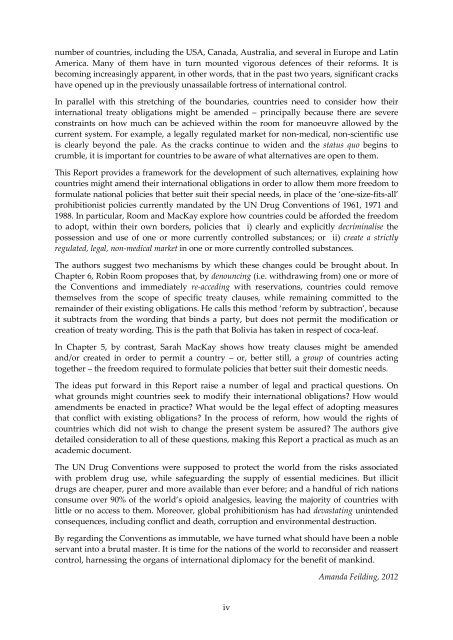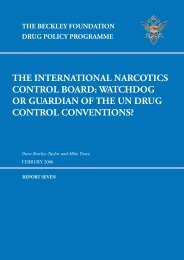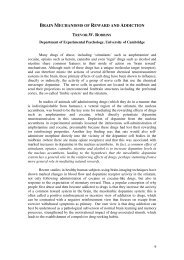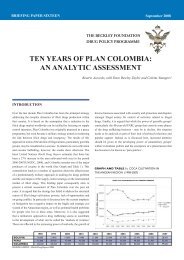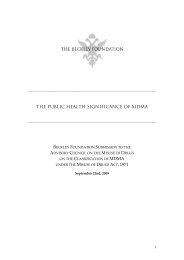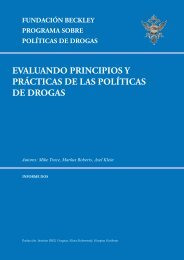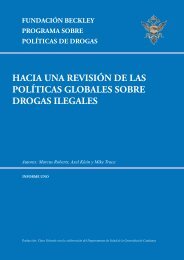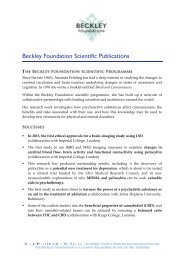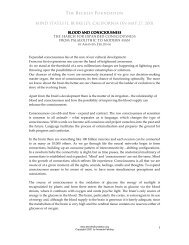PrefaceTHE IDEA FOR this Report came in 2010, when I was travelling with Robin Room and PeterReuter in Washing<strong>to</strong>n DC and Latin America <strong>to</strong> disseminate <strong>the</strong> Report of <strong>the</strong> <strong>Beckley</strong>Fo<strong>un</strong>dation’s Global Cannabis Commission. 1 Under <strong>the</strong> leadership of Robin Room, <strong>the</strong>Commission had drawn up a Draft Framework Convention on Cannabis Control, based on <strong>the</strong>WHO’s Framework Convention on Tobacco Control. During <strong>the</strong> trip, I formed <strong>the</strong> idea of aGlobal Initiative for Drug Policy Reform, which would commission new reports, and bring<strong>to</strong>ge<strong>the</strong>r high-level representatives of co<strong>un</strong>tries that had implemented reforms, co<strong>un</strong>triesinterested in experimenting with reform, and members of <strong>the</strong> Latin American Initiative onDrugs and Democracy (which later became <strong>the</strong> Global Commission on Drug Policy). For <strong>the</strong>Global Initiative’s first Report, Robin generously agreed <strong>to</strong> build on <strong>the</strong> work of <strong>the</strong>Cannabis Commission, <strong>to</strong> include all substances that fall <strong>un</strong>der <strong>the</strong> international <strong>drug</strong>control regime.In 2010, when Roadmaps for Reforming <strong>the</strong> UN Drug Conventions was commissioned, radicalreform of <strong>drug</strong> policy was very much a long-term aspiration, and <strong>the</strong> scenarios delineatedhere might have appeared purely hypo<strong>the</strong>tical. However, developments over <strong>the</strong>intervening two years have been so rapid, and so far-reaching, that <strong>to</strong>day this volume is ofclear practical relevance.The clamour for change has been spearheaded by Latin America, particularly by <strong>the</strong>leaders of <strong>drug</strong>-producing and transit co<strong>un</strong>tries, where <strong>the</strong> corrupting and lethal effects of<strong>the</strong> illicit <strong>drug</strong> trade that thrives <strong>un</strong>der prohibition are most keenly felt. In July 2012, at <strong>the</strong>invitation of President Ot<strong>to</strong> Pérez Molina, <strong>the</strong> <strong>Beckley</strong> Fo<strong>un</strong>dation set up its Latin AmericanChapter in Guatemala, in order <strong>to</strong> work with <strong>the</strong> President and his Government on <strong>the</strong>development of a range of alternative policy options aimed at reducing violence andcorruption in <strong>the</strong> region.At <strong>the</strong> UN General Assembly in September 2012, President San<strong>to</strong>s of Colombia, PresidentCalderón of Mexico and President Pérez Molina of Guatemala all spoke of <strong>the</strong> urgent need<strong>to</strong> explore alternatives <strong>to</strong> <strong>the</strong> War on Drugs. A proposal <strong>to</strong> create <strong>the</strong> world’s first legal,non-medical, regulated market in cannabis was taken <strong>to</strong> <strong>the</strong> Congress of Uruguay inNovember 2012. In <strong>the</strong> same month, <strong>the</strong> tide of change breached <strong>the</strong> confines of LatinAmerica, as voters in Washing<strong>to</strong>n and Colorado voted <strong>to</strong> legalise <strong>the</strong> cultivation andpossession of limited amo<strong>un</strong>ts of cannabis. At <strong>the</strong> time of writing, it remains <strong>un</strong>clear how<strong>the</strong> US Federal Government will respond <strong>to</strong> <strong>the</strong> demand of <strong>the</strong>se recalcitrant States.There are various approaches <strong>to</strong> harnessing <strong>the</strong> rising tide of reform. The most immediate is<strong>to</strong> work inside <strong>the</strong> ‘wriggle room’ that exists within <strong>the</strong> UN Drug Conventions. 2 This processof testing <strong>the</strong> bo<strong>un</strong>daries of what is possible has already beg<strong>un</strong>, creating tensions in <strong>the</strong>international <strong>drug</strong>-control regime. The UN’s quasi-judicial moni<strong>to</strong>ring body, <strong>the</strong>International Narcotics Control Board, has aimed sharp criticisms at <strong>the</strong> practices of a1Room, R. et al., Cannabis Policy: Moving Beyond Stalemate, first published in 2008 as a <strong>Beckley</strong> Report,and co-published in 2010 by <strong>the</strong> <strong>Beckley</strong> Fo<strong>un</strong>dation Press with Oxford University Press.2For a review, see Bewley-Taylor, D and Martin Jelsma, “The Limits of Latitude”, Series on LegislativeReform of Drug Policies No. 18. Transnational Institute, March 2012.iii
number of co<strong>un</strong>tries, including <strong>the</strong> USA, Canada, Australia, and several in Europe and LatinAmerica. Many of <strong>the</strong>m have in turn mo<strong>un</strong>ted vigorous defences of <strong>the</strong>ir reforms. It isbecoming increasingly apparent, in o<strong>the</strong>r words, that in <strong>the</strong> past two years, significant crackshave opened up in <strong>the</strong> previously <strong>un</strong>assailable fortress of international control.In parallel with this stretching of <strong>the</strong> bo<strong>un</strong>daries, co<strong>un</strong>tries need <strong>to</strong> consider how <strong>the</strong>irinternational treaty obligations might be amended – principally because <strong>the</strong>re are severeconstraints on how much can be achieved within <strong>the</strong> room for manoeuvre allowed by <strong>the</strong>current system. For example, a legally regulated market for non-medical, non-scientific useis clearly beyond <strong>the</strong> pale. As <strong>the</strong> cracks continue <strong>to</strong> widen and <strong>the</strong> status quo begins <strong>to</strong>crumble, it is important for co<strong>un</strong>tries <strong>to</strong> be aware of what alternatives are open <strong>to</strong> <strong>the</strong>m.This Report provides a framework for <strong>the</strong> development of such alternatives, explaining howco<strong>un</strong>tries might amend <strong>the</strong>ir international obligations in order <strong>to</strong> allow <strong>the</strong>m more freedom <strong>to</strong>formulate national policies that better suit <strong>the</strong>ir special needs, in place of <strong>the</strong> ‘one-size-fits-all’prohibitionist policies currently mandated by <strong>the</strong> UN Drug Conventions of 1961, 1971 and1988. In particular, Room and MacKay explore how co<strong>un</strong>tries could be afforded <strong>the</strong> freedom<strong>to</strong> adopt, within <strong>the</strong>ir own borders, policies that i) clearly and explicitly decriminalise <strong>the</strong>possession and use of one or more currently controlled substances; or ii) create a strictlyregulated, legal, non-medical market in one or more currently controlled substances.The authors suggest two mechanisms by which <strong>the</strong>se changes could be brought about. InChapter 6, Robin Room proposes that, by deno<strong>un</strong>cing (i.e. withdrawing from) one or more of<strong>the</strong> Conventions and immediately re-acceding with reservations, co<strong>un</strong>tries could remove<strong>the</strong>mselves from <strong>the</strong> scope of specific treaty clauses, while remaining committed <strong>to</strong> <strong>the</strong>remainder of <strong>the</strong>ir existing obligations. He calls this method ‘reform by subtraction’, becauseit subtracts from <strong>the</strong> wording that binds a party, but does not permit <strong>the</strong> modification orcreation of treaty wording. This is <strong>the</strong> path that Bolivia has taken in respect of coca-leaf.In Chapter 5, by contrast, Sarah MacKay shows how treaty clauses might be amendedand/or created in order <strong>to</strong> permit a co<strong>un</strong>try – or, better still, a group of co<strong>un</strong>tries acting<strong>to</strong>ge<strong>the</strong>r – <strong>the</strong> freedom required <strong>to</strong> formulate policies that better suit <strong>the</strong>ir domestic needs.The ideas put forward in this Report raise a number of legal and practical questions. Onwhat gro<strong>un</strong>ds might co<strong>un</strong>tries seek <strong>to</strong> modify <strong>the</strong>ir international obligations? How wouldamendments be enacted in practice? What would be <strong>the</strong> legal effect of adopting measuresthat conflict with existing obligations? In <strong>the</strong> process of reform, how would <strong>the</strong> rights ofco<strong>un</strong>tries which did not wish <strong>to</strong> change <strong>the</strong> present system be assured? The authors givedetailed consideration <strong>to</strong> all of <strong>the</strong>se questions, making this Report a practical as much as anacademic document.The UN Drug Conventions were supposed <strong>to</strong> protect <strong>the</strong> world from <strong>the</strong> risks associatedwith problem <strong>drug</strong> use, while safeguarding <strong>the</strong> supply of essential medicines. But illicit<strong>drug</strong>s are cheaper, purer and more available than ever before; and a handful of rich nationsconsume over 90% of <strong>the</strong> world’s opioid analgesics, leaving <strong>the</strong> majority of co<strong>un</strong>tries withlittle or no access <strong>to</strong> <strong>the</strong>m. Moreover, global prohibitionism has had devastating <strong>un</strong>intendedconsequences, including conflict and death, corruption and environmental destruction.By regarding <strong>the</strong> Conventions as immutable, we have turned what should have been a nobleservant in<strong>to</strong> a brutal master. It is time for <strong>the</strong> nations of <strong>the</strong> world <strong>to</strong> reconsider and reassertcontrol, harnessing <strong>the</strong> organs of international diplomacy for <strong>the</strong> benefit of mankind.Amanda Feilding, 2012iv
- Page 2 and 3: ROADMAPS TO REFORMINGTHE UN DRUG CO
- Page 4 and 5: ContentsPreface ...................
- Page 8: PART I. POSSIBLE ROADMAPS
- Page 11 and 12: hope for serious progress, but we c
- Page 13 and 14: We do not underestimate the difficu
- Page 15 and 16: also imposes requirements concernin
- Page 17 and 18: domestic market, just as producers
- Page 19 and 20: Protocol strengthened some provisio
- Page 21 and 22: ut considerably less potency than s
- Page 23 and 24: has announced its intention to reac
- Page 25 and 26: objected to. Concerning the 1971 tr
- Page 27 and 28: Table 2. Summary of reservations to
- Page 29 and 30: Reservations about traditional use
- Page 31 and 32: As Swaine notes, ‘the Vienna Conv
- Page 33 and 34: unhappy about a country implementin
- Page 35 and 36: Preemption by a new ‘single conve
- Page 37 and 38: and their effort was rejected by a
- Page 39 and 40: national or subnational level. Proh
- Page 42 and 43: Chapter 5. Proposed treaty amendmen
- Page 44 and 45: Article 1. DefinitionsExcept where
- Page 46 and 47: Article 36 - penal provisionsIn Art
- Page 48 and 49: Article 7. Special Provisions regar
- Page 50 and 51: and to ensure adequate supplies of
- Page 52 and 53: Article 1 − definition of ‘cons
- Page 54 and 55: Article 19 - estimates of drug requ
- Page 56 and 57:
Article 21. Limitation of Manufactu
- Page 58 and 59:
contrary to a law or regulation ado
- Page 60 and 61:
1. in subparagraph (a):a) after ‘
- Page 62 and 63:
) for ‘in accordance with paragra
- Page 64 and 65:
include a number of general stateme
- Page 66 and 67:
the legality of drug possession. A
- Page 68 and 69:
Chapter 7. Conforming the 1961 Conv
- Page 70 and 71:
solely by Article 30, which require
- Page 72 and 73:
on trade activities referred to in
- Page 74 and 75:
(c) Require that licensed manufactu
- Page 76 and 77:
issued in the form of counterfoil b
- Page 78:
APPENDIXDETAILED COMMENTARY ON AMEN
- Page 81 and 82:
Articles 21-34 of the Convention im
- Page 83 and 84:
dispatch, transport, supply, purcha
- Page 85 and 86:
actions involving commercial quanti
- Page 87 and 88:
In the 1971 Convention the followin
- Page 89 and 90:
4.1.3 Option 2 - changes to Preambl
- Page 91 and 92:
separate estimates and statistical
- Page 93 and 94:
After ‘scientific research’, in
- Page 95 and 96:
would also include transforming a d
- Page 97 and 98:
(c) subject to the provisions of th
- Page 99 and 100:
endangered’ by a Party’s failur
- Page 101 and 102:
Article 9. Composition and Function
- Page 103 and 104:
2. The Board shall, in respect of c
- Page 105 and 106:
for the right of the INCB to establ
- Page 107 and 108:
) Subject to the deductions referre
- Page 109 and 110:
excess quantity must be deducted fr
- Page 111 and 112:
prohibition in Article 31(1)(b) aga
- Page 113 and 114:
4.8 Article 20 - statistical return
- Page 115 and 116:
separate returns would be required
- Page 117 and 118:
4.9.1 General comments on Article 2
- Page 119 and 120:
distributors), and any quantity tak
- Page 121 and 122:
a) The quantity consumed, within th
- Page 123 and 124:
Article 21 bis. Limitation of Produ
- Page 125 and 126:
to engage in cultivation; and culti
- Page 127 and 128:
the purposes of Option 2. However,
- Page 129 and 130:
in Article 29 to manufacture of mor
- Page 131 and 132:
) (i) Require medical prescriptions
- Page 133 and 134:
4.15 Article 31(1) - international
- Page 135 and 136:
commercial use. Export to a state o
- Page 137 and 138:
would automatically mean that posse
- Page 139 and 140:
preparatory acts, conspiracy and at
- Page 141 and 142:
offering for sale, distribution, 17
- Page 143 and 144:
Article 36. Penal Provisions1. a) S
- Page 145 and 146:
Article 36. Penal Provisions1. a) S
- Page 147 and 148:
Conference would have intended to a
- Page 149 and 150:
drugs (in more than small quantitie
- Page 151 and 152:
substances into its country or one
- Page 153 and 154:
apply to Schedule 1 substances. In
- Page 155 and 156:
substances (of more than a small qu
- Page 157 and 158:
1. The Parties shall require that t
- Page 159 and 160:
individuals may lawfully obtain, us
- Page 161 and 162:
4. The Parties shall furnish to the
- Page 163 and 164:
2. In subparagraph (b):a) after ‘
- Page 165 and 166:
obligations on Parties in respect o
- Page 167 and 168:
penalise preparatory acts in connec
- Page 169 and 170:
accordance with subparagraph (a) of
- Page 171 and 172:
Article 3(1)(c)(iii) warrants speci
- Page 173 and 174:
6.1.2. Option 1 - changes to the 19
- Page 175 and 176:
uncertainty. Accordingly, Article 3
- Page 177 and 178:
Consequently, Parties would also no
- Page 179:
…4. d) The Parties may provide, e


